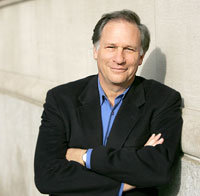
On this page, you'll find regularly updated audio, video, and text reports from our producers and correspondents. We invite you to join the discussion about topics covered here on our board and to subscribe to our audio and video podcasts to download these reports to your computer or MP3 player.
|
|
1.18.2005 Where the Action IsMy vision for NOVA scienceNOW comes from a very deep feeling that the most exciting news being made at this moment—if news means something that will change the fabric of your life—is probably not who gets elected President of the United States. What's most important is what human beings have learned about themselves, the planet they're on, and the universe they're part of. This is a time when our gaze has widened, and this is a show about what we can now see. I was an undergraduate history major who went to law school and then reported on law and economics for years. I got interested in science and science reporting because these days you go into a physics lab or a biology lab or a chemistry lab, and you look at the people standing there telling you about what they're doing, and they're on fire. Their eyes are telling you that this is the best time to be a scientist that you could possibly choose. There's an excitement and a sense of news being made that you just can't find at the White House, at the Pentagon, in a boardroom, or in Hollywood. So you want to be where the action is. It's my deep sense, and it started about five years ago, that I just want to be with scientists, because these people are having the time of their lives. All science fields appeal to me. There are people right now trying to create living things from nonliving things. That's only happened once so far. There are people who are cloning complex life forms. That's pretty exciting. And then there are people trying to figure out what everything is made of, why the universe works the way it does, how it begins, how it ends. What they're learning is that the world is built on such strange principles that you can't really see them at the scale where we live. The walls are coming down between different sciences, so there's a chemist at Cornell who I've done a lot of things with who's figuring out the answers to simple puzzles, like if you're a moth caught in a spider web can you escape? Are there moth tricks? What are the spider's tricks to get you into that thing? If you're an ant, among 600,000 ants rushing off to make war, how do you know how to stay in line, since ants can't see? And once you get to your goal and snatch your trophy ant, how do you know to take a left, exactly in the right way, and head back home along a side street? How do all the other ants know that? These are issues of chemistry, and they're wonderful puzzles. Note: This dispatch is an edited excerpt from a recent interview with Robert Krulwich. |
|||||||||||

Robert Krulwich is the host and executive editor of NOVA scienceNOW. He is also a correspondent for ABC News, reporting for ABC World News Tonight, Prime Time Live, Good Morning America, and Nightline. He contributes regularly to National Public Radio. Krulwich has explored the structure of DNA with a banana, illustrated the Texaco-Pennzoil battle with Barbie and Ken dolls, and demonstrated a video game by driving around in a car with Connie Chung. For nearly three decades, Krulwich's reports have made economics, technology, and science funny, entertaining, and comprehensible. Krulwich lives in New York City with his wife and two children. |
||||||||||||
|
© | Created January 2005 |
||||||||||||